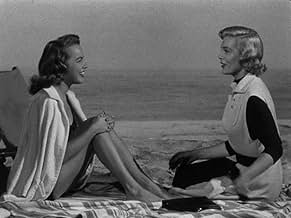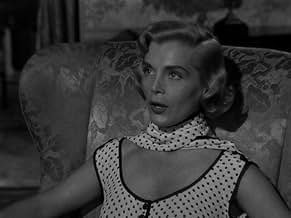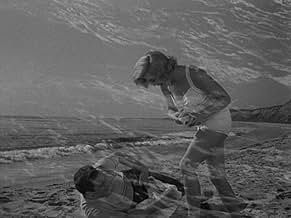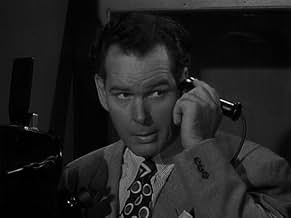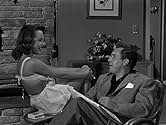Ajouter une intrigue dans votre langueA lawyer for a rich elderly industrialist works out a complex inheritance scam to pass off a con as the industrialist's long-lost son and claim the huge inheritance.A lawyer for a rich elderly industrialist works out a complex inheritance scam to pass off a con as the industrialist's long-lost son and claim the huge inheritance.A lawyer for a rich elderly industrialist works out a complex inheritance scam to pass off a con as the industrialist's long-lost son and claim the huge inheritance.
- Réalisation
- Scénario
- Casting principal
Jessie Arnold
- Woman at Phone Booth
- (non crédité)
Kathryn Card
- Bingo Woman
- (non crédité)
Claire Carleton
- Minnie Mitt
- (non crédité)
Louis Jean Heydt
- Chief Petty Officer
- (non crédité)
J.M. Kerrigan
- Father Lanahan
- (non crédité)
James Kirkwood
- Ben
- (non crédité)
Al Murphy
- Desk Sergeant
- (non crédité)
Emory Parnell
- First Deputy
- (non crédité)
Blackie Whiteford
- Man at Police Station
- (non crédité)
Avis à la une
If you like your film noir declawed and defanged, then Henry Levin's Two of a Kind is the movie for you. The vexing part is that it starts off strong, keeping the viewer off balance. Lizabeth Scott is scouring the continent looking for a particular man. Her quest takes her from a Chicago orphanage to the carny circuit to the Department of the Navy in Washington; she finally finds him, working in a bingo parlor, in Los Angeles where she started.
He's Edmond O'Brien, and she's after him because he fits the bill for a con job that she and her lover Alexander Knox have been hatching for a long time. A wealthy old couple has nobody to leave their fortune to, because their son vanished when he was only three years old. Knox, their attorney, and Scott are grooming O'Brien as a ringer to show up and claim the inheritance, which they'll all split. There are a couple of catches. For one, the kid lost the tip of his finger in a childhood accident, but since he can cash in his own fingertip for millions, O'Brien falls in with the scheme. The other is that Scott, to Knox's chagrin, starts to go sweet on O'Brien.
Up to the scene when Scott smashes O'Brien's finger in a car door, so he'll have reason to have the first two joints amputated, Two of a Kind promises to be low-down and unsentimental. But the movie's tone suffers an incapacitating fracture with the arrival of Terry Moore, as a niece of the old couple and the patsy through which O'Brien will secure his entry into the family's affections. (She's a vapid dilettante whose hobby is collecting `causes;' falling for no-good men and trying to reform them seems to be one of them.)
O'Brien gains admittance to the family; his candor about his raffish past puts him in good stead. But when the pot of gold seems just within reach, the patriarch drops a bombshell: He won't leave a cent to his newfound son on the grounds that it would ruin him. This prompts Knox to rachet up the swindle to the next level - arranging an early send-off for his unwitting benefactors. Scott and O'Brien demur, but by this time they're in too deep....
The dark tone of the opening returns briefly, but it's too late and doesn't last. Despite that brutal finger-smashing, there's a squeamishness to the movie that doesn't let it pursue the expectations it raises. The insipid ending opens regretful speculation: Whatever happened to the Lizabeth Scott of Too Late For Tears, the Edmond O'Brien of 711 Ocean Drive, and the Henry Levin who directed Night Editor?
He's Edmond O'Brien, and she's after him because he fits the bill for a con job that she and her lover Alexander Knox have been hatching for a long time. A wealthy old couple has nobody to leave their fortune to, because their son vanished when he was only three years old. Knox, their attorney, and Scott are grooming O'Brien as a ringer to show up and claim the inheritance, which they'll all split. There are a couple of catches. For one, the kid lost the tip of his finger in a childhood accident, but since he can cash in his own fingertip for millions, O'Brien falls in with the scheme. The other is that Scott, to Knox's chagrin, starts to go sweet on O'Brien.
Up to the scene when Scott smashes O'Brien's finger in a car door, so he'll have reason to have the first two joints amputated, Two of a Kind promises to be low-down and unsentimental. But the movie's tone suffers an incapacitating fracture with the arrival of Terry Moore, as a niece of the old couple and the patsy through which O'Brien will secure his entry into the family's affections. (She's a vapid dilettante whose hobby is collecting `causes;' falling for no-good men and trying to reform them seems to be one of them.)
O'Brien gains admittance to the family; his candor about his raffish past puts him in good stead. But when the pot of gold seems just within reach, the patriarch drops a bombshell: He won't leave a cent to his newfound son on the grounds that it would ruin him. This prompts Knox to rachet up the swindle to the next level - arranging an early send-off for his unwitting benefactors. Scott and O'Brien demur, but by this time they're in too deep....
The dark tone of the opening returns briefly, but it's too late and doesn't last. Despite that brutal finger-smashing, there's a squeamishness to the movie that doesn't let it pursue the expectations it raises. The insipid ending opens regretful speculation: Whatever happened to the Lizabeth Scott of Too Late For Tears, the Edmond O'Brien of 711 Ocean Drive, and the Henry Levin who directed Night Editor?
A 1951 film noir involving a lengthy grift being pulled on a rich couple. Lizabeth Scott starts the film off looking for a particular military man who's fallen off the grid who was aces as a soldier but his demeanor left something to be desired. Tracking the man down, played by Edmund O'Brien, at a bingo hall, Scott entices him w/the long con; an elderly married couple (who's wife is in a bad way) had lost their son & although presumed dead they hold out hope he may turn up whereby he'll leave him 10 million dollars in his will which Scott & her partner, played by Alexander Knox, will then split. The first hurdle, which O'Brien agrees to, is to chop off a part of one of his fingers (which he does when Scott slams a car door on it!) since the boy had this happen to him when he was younger & then settle into the machinations of the game, meeting the parents & laying out the possibly excruciatingly long stretch to see if the caper will come through w/O'Brien sticking around since he & Scott have connected romantically while Knox (revealed to be the couple's lawyer) bides his time waiting in the wings. I never bought the hook for this film & frankly O'Brien isn't quite convinced as well as his determination to complete the deal starts to waffle towards the film's end leaving the viewer w/a perplexed 'huh' on their face as we see if this long bet will pay out.
It's a nifty premise that fails to fulfill an early promise. Seductress Brandy (Scott) lures wiseguy Lefty (O'Brien) into a million-dollar fraud scheme. All it will cost him is time in a swanky beach house and half a finger. But that's okay because he'll still have nine and a-half left, plus a big inheritance from a wealthy old couple. Then too, if he gets cold feet, slinky Brandy is always there to warm him up. Mastermind Vincent (Knox) has hatched what looks like a sure thing.
However, I'm with reviewer bmacy. After that promising start, especially with the slamming car door, the movie takes an irretrievable tumble. And that's when Terry Moore's loopy overacting hits the scene. Catch that night time set-up where Lefty breaks into Kathy's (Moore) place and she squeals with delight over what appears a potential rapist or killer. Sorry, but that's about as poorly written and ill conceived a scene as I've witnessed in some time. And who was it who decided to insert Lefty's face-making as comedic accompaniment to Kathy's description of him. It's not only unnecessary, but unsubtly attacks the whole surrounding mood. As bmacy points out, by the time the movie recovers from such ruptures, it's already too late.
At the same time, director Levin appears to have little feel for the material, his career being mainly in light comedies. As a result, the story simply unfolds in pedestrian fashion without any distinguishing touches or development. As a result, and despite its two noir icons, the 80-minutes comes across as more disappointing than gritty crime drama.
However, I'm with reviewer bmacy. After that promising start, especially with the slamming car door, the movie takes an irretrievable tumble. And that's when Terry Moore's loopy overacting hits the scene. Catch that night time set-up where Lefty breaks into Kathy's (Moore) place and she squeals with delight over what appears a potential rapist or killer. Sorry, but that's about as poorly written and ill conceived a scene as I've witnessed in some time. And who was it who decided to insert Lefty's face-making as comedic accompaniment to Kathy's description of him. It's not only unnecessary, but unsubtly attacks the whole surrounding mood. As bmacy points out, by the time the movie recovers from such ruptures, it's already too late.
At the same time, director Levin appears to have little feel for the material, his career being mainly in light comedies. As a result, the story simply unfolds in pedestrian fashion without any distinguishing touches or development. As a result, and despite its two noir icons, the 80-minutes comes across as more disappointing than gritty crime drama.
Edmond O'Brien, Lizabeth Scott, Alexander Knox, and Terry Moore star in "Two of a Kind" from 1951.
Brandy Kirby (Scott) and an attorney, Vincent Mailer (Knox) for a wealthy man, William McIntyre find the perfect person in Lefty Farrell (O'Brien) to pretend to be the long-lost son of McIntyre's. He will then inherit $10 million, and since McIntyre and his wife are old, there won't be long to wait until he inherits.
Brandy seduces Lefty into taking the job. In order to do it, he has to lose part of his little finger, as the McIntyre's son did. A friend of Brandy's (MooreO who is the McIntyre's niece, introduces him to them when she sees his finger and asks questions. It's looking good that Lefty will be accepted as the son and inherit a fortune.
I had a few problems with this noir. The writer tried to lighten it up with the presence and perky acting of Terry Moore, which was way out of place and came off as overdone.
Lefty is supposed to be a real charmer and a chick magnet. I'm sorry, Edmond O'Brien? Good actor but hardly oozing with sex and good looks. Under contract at that time were William Holden and Glenn Ford. I doubt many women would have turned them down.
Lizabeth Scott, one of the noir queens, looked great in her gorgeous clothes and shorter hair and, with that smoky voice of hers, was very effective. Knox really didn't have much to do. O'Brien was good as usual but for me, wrong for the part.
Without the Moore character and better casting of Lefty, the film would have been stronger. Instead, it was just passable.
Brandy Kirby (Scott) and an attorney, Vincent Mailer (Knox) for a wealthy man, William McIntyre find the perfect person in Lefty Farrell (O'Brien) to pretend to be the long-lost son of McIntyre's. He will then inherit $10 million, and since McIntyre and his wife are old, there won't be long to wait until he inherits.
Brandy seduces Lefty into taking the job. In order to do it, he has to lose part of his little finger, as the McIntyre's son did. A friend of Brandy's (MooreO who is the McIntyre's niece, introduces him to them when she sees his finger and asks questions. It's looking good that Lefty will be accepted as the son and inherit a fortune.
I had a few problems with this noir. The writer tried to lighten it up with the presence and perky acting of Terry Moore, which was way out of place and came off as overdone.
Lefty is supposed to be a real charmer and a chick magnet. I'm sorry, Edmond O'Brien? Good actor but hardly oozing with sex and good looks. Under contract at that time were William Holden and Glenn Ford. I doubt many women would have turned them down.
Lizabeth Scott, one of the noir queens, looked great in her gorgeous clothes and shorter hair and, with that smoky voice of hers, was very effective. Knox really didn't have much to do. O'Brien was good as usual but for me, wrong for the part.
Without the Moore character and better casting of Lefty, the film would have been stronger. Instead, it was just passable.
It Seems that the Sharp, Dark, Rough World of Film-Noir was just too Much for the Newly Emerging Conservative 1950's.
The Forces that be were Out to Tame Film-Noir and Morph the Style into Police Procedurals, and Other Easily Digested Movies "Sweetening" the "Sour".
Case-in-Point, "Two of a Kind", this one had All the Signs of the Genre .
But were Proven a Slight-of-Hand, sort of, or a Mis-Direction.
Starring Noir Icon's Edmond O'Brien and Lizabeth Scott and a Poster that Shows Not a Hint that it will Take a "Detour" to Comedy, and a Light-Hearted Approach as the Con-Game is Played-Out.
When Terry Moore's "Screwy" Character Shows-Up, it No-Longer even Tries to Maintain its Bona-Fides as a Film-Noir.
It has One Extremely Disturbing Scene, "The Car-Door", but the Rest of the Story is so Breezy and Aloof as to be Distracting to Anyone who was Expecting a More Serious, Gritty Story.
Overall, it can be Enjoyed as a Light-Crime Con-Game with Good Actors and Good Cinematography.
The Genre of Film-Noir, to This Day, is Exploited and the Label is Slapped on Movies that Just Don't Cut-It. The True Essence and Meaning of the Descriptive has been Lost Almost Completely.
This Whole Thing Started Around 1950-51 and is Still Around Today.
For Film-Noir Purist, be Prepared for a Let-Down.
The Forces that be were Out to Tame Film-Noir and Morph the Style into Police Procedurals, and Other Easily Digested Movies "Sweetening" the "Sour".
Case-in-Point, "Two of a Kind", this one had All the Signs of the Genre .
But were Proven a Slight-of-Hand, sort of, or a Mis-Direction.
Starring Noir Icon's Edmond O'Brien and Lizabeth Scott and a Poster that Shows Not a Hint that it will Take a "Detour" to Comedy, and a Light-Hearted Approach as the Con-Game is Played-Out.
When Terry Moore's "Screwy" Character Shows-Up, it No-Longer even Tries to Maintain its Bona-Fides as a Film-Noir.
It has One Extremely Disturbing Scene, "The Car-Door", but the Rest of the Story is so Breezy and Aloof as to be Distracting to Anyone who was Expecting a More Serious, Gritty Story.
Overall, it can be Enjoyed as a Light-Crime Con-Game with Good Actors and Good Cinematography.
The Genre of Film-Noir, to This Day, is Exploited and the Label is Slapped on Movies that Just Don't Cut-It. The True Essence and Meaning of the Descriptive has been Lost Almost Completely.
This Whole Thing Started Around 1950-51 and is Still Around Today.
For Film-Noir Purist, be Prepared for a Let-Down.
Le saviez-vous
- AnecdotesThe plot bears a resemblance to that of the 1945 noir "Detour," where a drifter, with the insistence of a scheming female, attempts to inherit the fortune of a recently deceased man by assuming the identity of the man's long-lost son.
- Citations
Michael "Lefty" Farrell: But first, I used to slip away from Daddy and run, kiss Mommy goodnight, like this.
[plants a big kiss on Brandy]
- ConnexionsReferenced in Dynastie: Trashy Little Tramp (2018)
Meilleurs choix
Connectez-vous pour évaluer et suivre la liste de favoris afin de recevoir des recommandations personnalisées
- How long is Two of a Kind?Alimenté par Alexa
Détails
- Durée1 heure 15 minutes
- Couleur
- Rapport de forme
- 1.37 : 1
Contribuer à cette page
Suggérer une modification ou ajouter du contenu manquant

Lacune principale
By what name was Two of a Kind (1951) officially released in India in English?
Répondre


